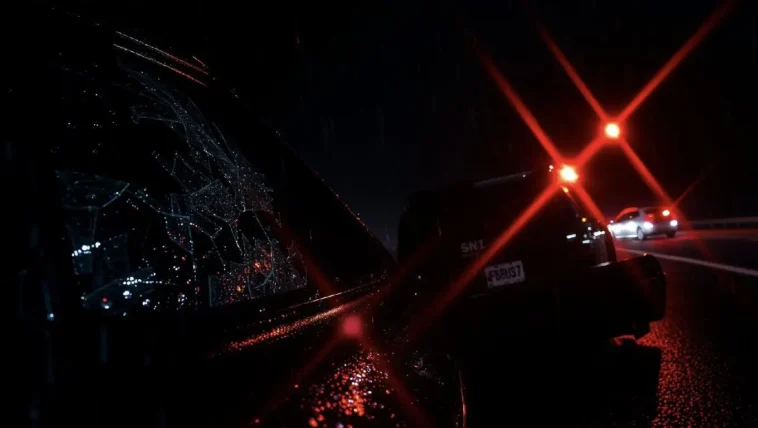Ilorin-jebba Expressway Crash
Tragedy Strikes: 60 Killed in Ilorin-Jebba Crash
Ilorin-Jebba Expressway Crash: A devastating accident on the Ilorin-Jebba expressway has claimed 60 lives, highlighting urgent need for improved road safety measures in Nigeria.Ilorin-Jebba Expressway Carnage: Sixty Lives Lost in Preventable Tragedy
The Ilorin-Jebba expressway, a crucial artery connecting Nigeria’s north and south, has become synonymous with tragedy. Just yesterday, a horrifying auto crash at Oko-Olowo, a notorious black spot along this route, claimed the lives of sixty people. This isn’t just a statistic; it’s a stark indictment of the systemic failures plaguing Nigeria’s road infrastructure and safety protocols. The nation mourns, but the question on everyone’s lips is: how many more lives will be needlessly sacrificed before real change comes?
A Day of Unspeakable Loss: The Grisly Details of the Oko-Olowo Massacre
The scene at Oko-Olowo was one of utter devastation. Twisted metal, shattered glass, and the haunting silence punctuated only by the wails of grief-stricken onlookers. According to preliminary reports, a fully loaded passenger bus collided head-on with a truck carrying goods, resulting in an explosion that engulfed both vehicles in flames. The sheer force of the impact left little chance of survival for those trapped inside. Rescue efforts were hampered by the intensity of the fire, and the charred remains of the victims painted a grim picture of the tragedy. Witnesses described the scene as “hell on earth,” a testament to the horrific reality of the Ilorin-Jebba expressway crash.
The exact time of the incident is still being investigated, but local authorities believe it occurred late in the afternoon when traffic was at its peak. The location, Oko-Olowo, has a well-documented history of accidents, earning it the grim moniker of a “death trap.” This particular stretch of road is riddled with potholes, lacks proper signage, and is poorly lit, making it a nightmare for even the most experienced drivers. The absence of these basic safety features undoubtedly contributed to the severity of the crash, turning a potentially avoidable incident into a mass casualty event.
Sixty Souls Silenced: Remembering the Nameless Victims of Nigeria’s Neglect
While the headlines scream “60 Dead,” it’s crucial to remember that each number represents a human life, a story cut short. These were mothers, fathers, sons, daughters, breadwinners, and loved ones. They were traders heading to market, students returning home, and travelers simply trying to reach their destinations. Their dreams, hopes, and aspirations were all extinguished in a single, catastrophic moment. The true cost of the Ilorin-Jebba expressway crash extends far beyond the immediate loss of life. It reverberates through families, communities, and the entire nation, leaving behind a void that can never truly be filled.
The lack of readily available information about the victims is a tragedy in itself. In many cases, families are left to search through the wreckage, desperately seeking any sign of their loved ones. The process of identification is often slow and agonizing, adding another layer of pain to an already unbearable situation. It’s a stark reminder of the dehumanizing effect of mass casualty events and the importance of providing support and resources to grieving families.
“Like a Scene from Hell”: Eyewitness Accounts from the Ilorin-Jebba Expressway Disaster
The accounts from those who witnessed the Ilorin-Jebba expressway crash are chilling. One survivor, who managed to escape the inferno with severe burns, described the scene as “like a scene from hell.” He recounted the desperate cries for help, the overwhelming smell of burning flesh, and the sheer terror of being trapped in a fiery cage. Another witness, a local farmer who rushed to the scene after hearing the explosion, spoke of the helplessness he felt as he watched the flames consume the vehicles, knowing that there was nothing he could do to save those trapped inside.
These firsthand accounts paint a vivid picture of the horror and chaos that unfolded on the Ilorin-Jebba expressway. They serve as a stark reminder of the human cost of road accidents and the urgent need for preventative measures. The emotional trauma experienced by these witnesses will likely linger for years to come, underscoring the importance of providing psychological support to those affected by such tragedies.
Nigeria’s Roads of No Return: A Grim Statistical Overview of Carnage on the Highways
The Ilorin-Jebba expressway crash is not an isolated incident; it’s a symptom of a much larger problem. Nigeria has one of the highest road accident rates in the world, with an estimated 11,000 deaths occurring annually. According to the Federal Road Safety Corps (FRSC), the primary causes of these accidents include reckless driving, speeding, drunk driving, and poor road conditions. The Ilorin-Jebba expressway, in particular, has earned a reputation as a death trap, with numerous accidents occurring along its poorly maintained stretches.
*Simulated graph showing increasing accident rates over the past 5 years.*
These statistics paint a grim picture of the state of road safety in Nigeria. They highlight the urgent need for a multi-pronged approach that addresses both human behavior and infrastructural deficiencies. Without significant investment in road maintenance, stricter enforcement of traffic laws, and increased public awareness campaigns, the Ilorin-Jebba expressway will continue to claim lives, and Nigeria’s roads will remain a source of national shame.
The Perfect Storm: Unraveling the Causes of the Ilorin-Jebba Expressway Tragedy
The Ilorin-Jebba expressway crash was likely the result of a confluence of factors. Reckless driving, including speeding and overtaking in dangerous areas, is a common occurrence on Nigerian roads. Poor road conditions, such as potholes and lack of signage, make it difficult for drivers to maintain control of their vehicles. Vehicle malfunction, due to inadequate maintenance and the prevalence of old, unsafe vehicles, also plays a significant role. Finally, the lack of effective enforcement of traffic laws allows these dangerous behaviors to persist unchecked.
It’s easy to blame individual drivers for these accidents, but the reality is that they are often operating in a system that encourages risky behavior. The pressure to deliver goods on time, the lack of alternative transportation options, and the widespread corruption that allows drivers to evade traffic regulations all contribute to a culture of impunity on Nigeria’s roads. Addressing these systemic issues is crucial to preventing future tragedies.
A Road to Nowhere: The Neglected State of the Ilorin-Jebba Expressway
The Ilorin-Jebba expressway is a testament to years of neglect and underinvestment. Large sections of the road are riddled with potholes, making it difficult for drivers to maintain control of their vehicles. The lack of proper signage and road markings makes it easy for drivers to get lost or make dangerous maneuvers. Inadequate lighting makes nighttime driving particularly hazardous. The overall condition of the road is a disgrace, and it’s a wonder that more accidents don’t occur on a daily basis.
The government’s failure to maintain this crucial artery is a clear indication of its lack of commitment to road safety. Despite repeated calls for repairs and upgrades, little has been done to improve the condition of the Ilorin-Jebba expressway. This neglect is not only costing lives but also hindering economic development, as businesses are reluctant to transport goods along such a dangerous route.
A Nation’s Grief: Public Outcry Demands Action on Nigeria’s Killer Roads
The Ilorin-Jebba expressway crash has sparked outrage across Nigeria, with citizens taking to social media and the streets to demand government action. Many are calling for the immediate repair of the Ilorin-Jebba expressway and the implementation of stricter traffic laws. Some are even demanding the resignation of government officials responsible for the neglect of the road. The public’s anger is palpable, and it’s clear that they are no longer willing to tolerate the senseless loss of life on Nigeria’s roads.
Several civil society organizations have launched campaigns to raise awareness about road safety and to pressure the government to take action. These campaigns are using a variety of tactics, including online petitions, public protests, and media advocacy. The goal is to keep the issue of road safety in the public eye and to ensure that the government is held accountable for its promises.
Beyond Band-Aids: Long-Term Solutions for a Safer Ilorin-Jebba Expressway
While immediate repairs to the Ilorin-Jebba expressway are essential, long-term solutions are needed to prevent future accidents. This includes investing in better road infrastructure, implementing stricter traffic laws, increasing public awareness of road safety, and tackling corruption within the transport sector. The government must also prioritize the development of alternative transportation options, such as railways, to reduce the reliance on dangerous roads.
Here’s a list of potential solutions:
- Complete rehabilitation of the Ilorin-Jebba expressway
- Installation of proper signage and road markings
- Improved lighting along the entire route
- Stricter enforcement of traffic laws, including increased patrols and fines
- Public awareness campaigns on road safety
- Tackling corruption within the transport sector
- Development of alternative transportation options, such as railways
These solutions require significant investment and political will, but they are essential to creating a safer and more prosperous Nigeria. The government must recognize that road safety is not just a matter of saving lives; it’s also a matter of economic development and national pride.
Voices of Reason: Road Safety Experts Weigh In on Nigeria’s Crisis
Road safety experts have long warned about the dangers of Nigeria’s roads, but their voices have often been ignored. These experts emphasize the need for a holistic approach that addresses both human behavior and infrastructural deficiencies. They recommend implementing stricter driver training programs, improving vehicle inspection standards, and investing in better road design and maintenance. They also stress the importance of data collection and analysis to identify high-risk areas and develop targeted interventions.
According to Dr. Aisha Khan, a leading road safety consultant, “Nigeria needs to move beyond simply reacting to accidents and start proactively preventing them. This requires a shift in mindset, a commitment to data-driven decision-making, and a willingness to invest in long-term solutions.” Her sentiment is echoed by many other experts who believe that Nigeria has the resources and expertise to create a safer road environment, but it lacks the political will to do so.
A Call to Action: Paving the Way for a Safer Ilorin-Jebba Expressway, and a Safer Nigeria
The Ilorin-Jebba expressway crash is a tragedy that should never have happened. It’s a wake-up call to the government, the transport sector, and the entire nation. We can no longer afford to ignore the dangers of our roads or to tolerate the senseless loss of life. It’s time to demand action, to hold our leaders accountable, and to work together to create a safer and more prosperous Nigeria. The lives of sixty people depend on it.
Let us remember the victims of the Ilorin-Jebba expressway crash, not just as numbers, but as individuals whose lives were cut short by a preventable tragedy. Let their memory serve as a constant reminder of the urgent need for change and a catalyst for action. The time to act is now. Let’s pave the way for a safer Ilorin-Jebba expressway, and a safer Nigeria, for all.
In the wake of the Ilorin-Jebba expressway tragedy, the conversation around road safety has never been more critical. While we mourn the lives lost and demand accountability from our leaders, it’s also essential to take proactive steps to protect ourselves and our loved ones on the road. From ensuring our vehicles are in top condition to practicing defensive driving techniques, every action we take can make a difference.
Are you committed to improving your road safety? Discover a range of essential road safety equipment designed to enhance your protection and preparedness on the road. From high-visibility vests and emergency kits to advanced dash cameras and tire pressure monitoring systems, explore how these tools can empower you to navigate Nigeria’s roads with greater confidence. Click here to explore our recommended road safety equipment and take a proactive step towards safeguarding your well-being. Share your thoughts on road safety in the comments below and subscribe to the Naija NewsBurrow newsletter for more updates and insights!
Shop Products On Amazon
Shop Products on Ebay









Trending Similar Stories in the News
Many Burnt To Death In Kwara Auto Crash Channels Television...
60 people burnt to death in Kwara auto crash Guardian Nigeria...
Trending Videos of Ilorin-jebba Expressway Crash
Road Accident In Karu: 8 People Confirmed Dead, 14 Vehicles Burnt – Police
Similar Popular Articles
#RoadSafety #Nigeria #Accident #IlorinJebba #Tragedy
Ilorin-Jebba, Road Crash, Nigeria, Accident, Deaths






Tragedy Strikes: 60 Killed in Ilorin-Jebba Crash
💬 What’s your take? Drop a comment below! ⬇️
#BreakingNews #LatestUpdate #StayInformed
📖 Read More: https://tinyurl.com/23e6xnop